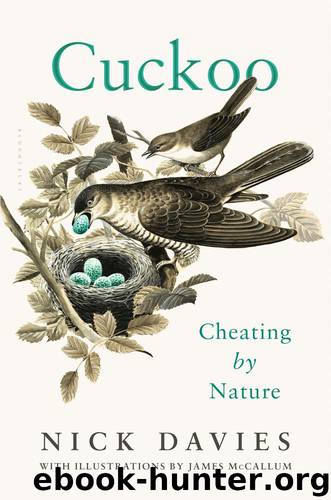Cuckoo by Nick Davies

Author:Nick Davies
Language: eng
Format: mobi
Publisher: Bloomsbury Publishing
Published: 2015-02-10T08:00:00+00:00
Discriminating cuckoo eggs involves two stages. So far, we have examined the first stage, namely how the hosts recognise a foreign egg. The answer is that they learn the complex signatures of their own eggs so that they can recognise foreign eggs with a different pattern. In effect, they follow that security advice from banks to customers: do not rely on one single feature, and if in doubt compare a suspected forgery with a signature you know is genuine.
The second stage is the decision to accept or reject. Imagine that the hosts notice an egg slightly different from their learnt set: should they reject it? It could be a cuckoo egg, but it could be one of their own, perhaps a rare type they have not seen before, or one that got soiled in the nest lining. A sensible host should take account not only of the appearance of a suspect egg but also of the probability of parasitism. Just as we are more likely to lock our doors and guard our possessions when there are thieves at large, so hosts should vary their rejection threshold depending on how they assess the risks of parasitism.
We have already encountered evidence that hosts are cautious about egg rejection. Several hosts, including reed warblers, are more likely to reject a cuckoo egg if they see a cuckoo at their nest, either a real one or a stuffed cuckoo in an experiment. Why do hosts need to be alerted in this way? Why not always reject? The host’s caution would make sense if they sometimes made mistakes and rejected one of their own eggs. Perhaps the risk of a mistake is worthwhile only when the hosts have good reason to believe that a cuckoo has laid an egg in their nest.
Our observations on Wicken Fen show that reed warblers do indeed risk making mistakes when they reject eggs. First they make recognition errors. When there was a well-matching cuckoo egg in their nest, either a real cuckoo egg or one of our mimetic model eggs, the reed warblers got it right and ejected the foreign egg at 70 per cent of the nests, but they made a mistake at the other 30 per cent of the nests and threw out one of their own eggs rather than the cuckoo egg. Strong evidence that these are recognition errors comes from the fact that reed warblers did not make this mistake when the model egg in the nest was clearly different from their own. Other studies have also shown that hosts are more likely to make recognition errors when cuckoos have highly mimetic eggs.
Second, hosts sometimes eject one of their own eggs even when they are not parasitised. These false alarms are also inevitable when the host’s recognition system is not perfect. So hosts have a conundrum. As they increase the chance of getting rid of cuckoo eggs, by throwing out a suspect egg, they will inevitably incur the cost of more false alarms.
What should the hosts do? The obvious answer is they should vary egg rejection depending on the risks of parasitism.
Download
This site does not store any files on its server. We only index and link to content provided by other sites. Please contact the content providers to delete copyright contents if any and email us, we'll remove relevant links or contents immediately.
Sapiens: A Brief History of Humankind by Yuval Noah Harari(14389)
The Tidewater Tales by John Barth(12659)
Mastermind: How to Think Like Sherlock Holmes by Maria Konnikova(7343)
The Thirst by Nesbo Jo(6944)
Do No Harm Stories of Life, Death and Brain Surgery by Henry Marsh(6941)
Why We Sleep: Unlocking the Power of Sleep and Dreams by Matthew Walker(6722)
Life 3.0: Being Human in the Age of Artificial Intelligence by Tegmark Max(5558)
Sapiens by Yuval Noah Harari(5370)
The Body: A Guide for Occupants by Bill Bryson(5096)
The Longevity Diet by Valter Longo(5064)
The Rules Do Not Apply by Ariel Levy(4969)
The Immortal Life of Henrietta Lacks by Rebecca Skloot(4587)
Animal Frequency by Melissa Alvarez(4470)
Why We Sleep by Matthew Walker(4445)
The Hacking of the American Mind by Robert H. Lustig(4381)
Yoga Anatomy by Kaminoff Leslie(4363)
All Creatures Great and Small by James Herriot(4320)
Double Down (Diary of a Wimpy Kid Book 11) by Jeff Kinney(4268)
Embedded Programming with Modern C++ Cookbook by Igor Viarheichyk(4179)
